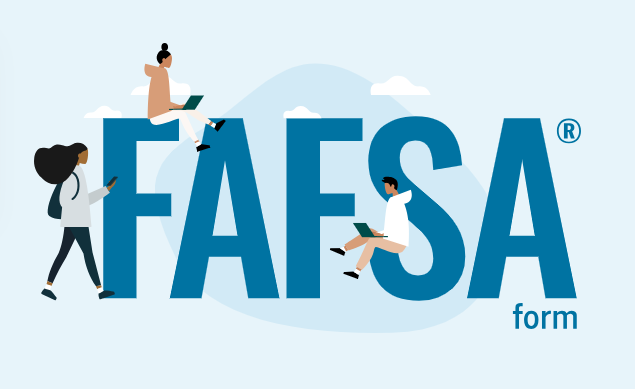The Free Application for Federal Student Aid (FAFSA®) is a form used to be considered for financial aid for school. Though it is provided through an office of the US Department of Education, Federal Student Aid, the form is the key for students to be considered for federal aid, state aid, and institutional aid to pursue their postsecondary goals.
What does ‘postsecondary’ mean?
Postsecondary education can be many things. It can be a degree from a four-year or two-year institution, like a university or community college. Postsecondary can also mean vocational or technical school (like cosmetology school), or programs that provide the student with an industry-recognized credential (like a culinary arts specialist, an automotive technician, or a medical assistant).
What does ‘financial aid’ mean?
Financial aid is a general term for funds that help a student pay for their education. Aid can come from multiple sources and can have different expectations. For example, a student can receive aid from the federal government, from the state, or from the school/program to which they apply.
Types of aid:
Federal Loans: Money from the federal government that must be paid back after completing postsecondary education. There are subsidized and unsubsidized federal loans. Subsidized loans are available to undergraduate students with financial need and do not accrue interest while students are in school. Unsubsidized loans are available for undergraduate and graduate students, with no requirement to demonstrate financial need. However, unsubsidized loans will accrue interest while students are still in school. Still, interest rates are fixed and often much lower than those from private or bank loans. Parent PLUS loans are an additional federal student loan option. These should be considered a last resort for aid.
Grants: Money granted that is usually based on the student’s financial need. This is money that does not need to be paid back by the student. Grants can be awarded from the student’s school, from the government, or from other entities. Usually, the FAFSA is required to be considered for a grant.
Scholarships: Money granted that is usually merit-based. This is money that does not need to be paid back by the student. Scholarships can be awarded from the student’s school, or from other entities. For example, students can apply for scholarships wherever they can be found (through corporations, community organizations, faith-based institutions, etc.). Sometimes scholarships have expectations (i.e. maintaining a minimum GPA or a certain number of credits). If scholarship expectations are not met, the student’s scholarship may not be renewed for the following year. It is important to understand any requirements associated with a scholarship. Usually, a FAFSA is required to be considered for a grant.
Gifts: Money outside of the student’s (or student’s parents’ income) that can be used to pay for school. For example, money that a student’s grandparent set aside when they were born could be considered a gift.
Work-Study: The federal work-study program provides students with an opportunity to work part-time at their school for extra money while attending school. Money earned by the student is theirs to keep. A FAFSA is required to be considered for a grant.
Private/Bank Loans: Loans that a student or student’s family may apply for, and do not require a FAFSA. These types of loans have variable interest rates which are much higher interest rates and require students to begin repayment immediately. Credit checks will be part of a private or bank loan process. It is highly recommended that students seek other forms of financial aid before turning to private or bank loans.
Students should visit the Federal Student Aid website to complete a FAFSA form.
Quick FAFSA facts:
- The FAFSA must be re-submitted for every year that a student attends school.
- FAFSA uses federal tax information to help determine a student’s eligibility for aid.
- Students are not required to accept any of the awards they receive because of the FAFSA. It is simply the key to open the door to financial aid options.
- The State of New Jersey has an organization called the Higher Education Student Assistance Authority (HESAA) dedicated to supporting students in postsecondary financial aid. This office exists solely to support a student’s journey through seeking financial aid to attend school.
- There is an alternate process for students who are not eligible to complete the FAFSA in New Jersey. NJ Dreamers is the New Jersey Alternative Financial Aid Application.
- The government may not use information provided on the FAFSA for any purpose other than postsecondary financial aid. The FUTURE Act, among other stipulations, places strict limits on how information can be used. Federal Student Aid states that “Federal Tax Information” will only be available to institutions, state higher education agencies, and designated scholarship organizations.

